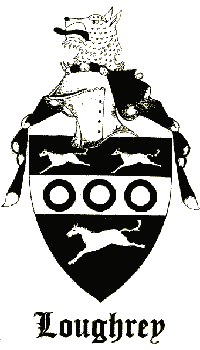| |
| |
| |
| |
| |
| |
| |
| |
| |
| |
| |
| |
| |

Crest
 In 1965, Julia Loughrey Ribbens received a copy of her uncle Peter Loughrey's
Story of the Loughrey Clan, and an accompanying letter containing the "blazon"
for the Loughrey coat of arms (a "blazon" describes the various graphic elements of a shield
or crest in such a way that they can be correctly rendered). It read:
In 1965, Julia Loughrey Ribbens received a copy of her uncle Peter Loughrey's
Story of the Loughrey Clan, and an accompanying letter containing the "blazon"
for the Loughrey coat of arms (a "blazon" describes the various graphic elements of a shield
or crest in such a way that they can be correctly rendered). It read:
"Gules on fess between three horses courant argent, three annulets azure. Crest: a wolf's head erazed ermine."
A few years later, Julia decided to give a coat of arms and crest to each of her Lee Loughrey family members, and had a potter friend create earthenware plates from this rather cryptic historical description. Later, however, Julia learned there were some mistakes in her graphic interpretations, and she set out to create a more accurate rendering.
"My real study began," Julia says, "when my husband gave me the book Heraldry, by Julian Franklin. As I delved more deeply, I returned, vicariously, to the land of our Loughrey ancestors, back to the Middle Ages, back to the time of the Norman kings, when their heralds served as messengers for their noble households. I imagined the Heralds arranging the jousting tournaments, which were the aristocratic (equivalent of) football matches, the mock battles of the Middle Ages...when the heralds must identify themselves with a picture painted on their shields."
As Julia continued her reading, she learned more about the Middle Ages, and finally deciphered the detailed meanings of the terms used in the Loughrey blazon. They include:
"Gules" - The color red; usually vermillion.
"Fess" - A broad horizontal band drawn across the center of the shield.
"Three horses courant" - Horses running at full speed, usually shown with fore-legs stretched in front and hind legs together in the rear (despite the fact that this position is anatomically impossible).
"Argent" - The metal silver, which is usually represented as white.
"Three Annulets Azure" - Annulets are rings (generally used as the mark of a fifth son). Azure is the color blue.
"Crest" - The element atop the coat of arms, which may originally have been used only to denote persons of a certain rank or nobility.
"Erazed" - Torn off roughly to leave a jagged edge.
"Ermine" - One of the principle furs used in heraldry, which consists of black ermine tails drawn on a white field. (The term "Ermines," on the other hand, would mean the opposite: white tails on a black field.)
Julia's extensive reading on heraldry also taught her that the original heraldic laws of the United States were adopted from the British, who always turn their crests, and all the symbols (charges) on them, to the viewer's left (sinister)...that color on color, or metal on metal, was never used in the placement of the various elements...and that the use of "esquire helmets" is advised.
Newly equipped with these helpful details, Julia went back to work, and created the Loughrey coat of arms that we use today. The design has been adapted several times for use on the T-shirts we sell at our biennial Loughrey reunions, and Julia has also published her study of Loughrey heraldry in a pamphlet, Loughrey - Our Complete Achievement, which she will gladly provide to interested members of the Loughrey Family Association.